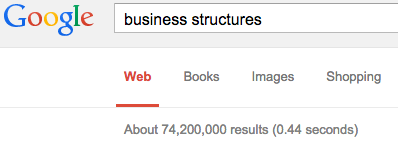Innovation in Ed: What is real academic rigor?
"First they ignore you. Then they laugh at you. Then they fight you. Then you win." — Gandhi
At Iowa BIG, we've pushed the envelope of re-inventing education so far and so fast that we're seeing some pushback. This is actually a good sign, as we as a State need to have a serious discussion about the need to change education more rapidly than what we're seeing. One area where we find pushback from peers in the United States is in regards to the concept of academic "rigor." Let's take a little test here to see if we can all agree what a real rigor looks like: which of the below scenarios is more rigorous?

- Telling students to memorize several forms of business entities and then have them regurgitate the answers onto a sheet of paper OR telling students that they've advanced so far that they should file to organize under one of the multiple businesses in the State of Iowa and it's recommend that they choose a Limited Liability Company for such and such reasons. (Three Iowa BIG companies have organized as LLCs this year.)
- Telling students about the structure of the local and state government, after which you tell the students that they'll be tested Thursday OR telling students that on Thursday they have a meeting with the local City government to present their design or findings in order to be implemented by said government or private entity. (Urban Orchards, Zero Myles, Bever Park redesign, Johnson STEAM Academy redesign, etc.)
- Telling students to create a five paragraph essay that includes an introductory paragraph with Thesis Statement, three supporting paragraphs, and a conclusion OR teaching students how to write a compelling science-backed email to the Iowa Department of Education in order to keep an Initiative moving forward during "summer break." (Erase the ACE)
- Assigning students to random project teams in order to complete and present a project OR allowing students to self-select projects for which they have passion along with fellow passionate students and business members in our community for the purpose of actual implementation. (Dozens of examples this past year.)
- Asking students to repetitively answer the odd questions in a geometry textbook OR learning geometry by creating 3D models via Sketchup for business partner Shive-Hattery, resulting in an actual physical remodel of Johnson Elementary STEAM Academy due to open in 10 days.
Information and knowledge were once at a premium. Now information is like air—it's free and easily accessible. The premium is now wisdom, defined as "applied knowledge."

Whenever we ask ourselves how we should orchestrate rigorous student learning one litmus test question emerges, namely, "How do real people in the real world do this?" RARELY do we find that the answer is, "People collect in a room and get lectured at, only to have to spit it back out on a sheet of paper later and then forgotten." Okay, we've never found this to be the answer, although we've found many times where "responsive" lectures are helpful at key times in response to student need.
"So Susie, your team needs a better grasp of social media. We'll invite one of our social media partners to meet with your team tomorrow." That's the power of inviting the public back into public education—real rigor with real outcomes intended for a real audience.

An Iowa BIG student (we'll stick with Susie) will walk away at the end of the school year with credit for, say, Government, even though the rigor differs from the traditional high school classroom greatly. The BIG student's resume shows that she worked hand-in-hand with government agencies, nonprofits, and for-profits, as well as other BIG students. Susie also has her creation of digital scans of landscape plans from Cedar Rapids' first Urban Orchard, as well as TV news stories and photos of all the partners planting the trees on a beautiful spring day. Let's not forget Susie's new-found community network and her growing personal brand. Also, tell me this, will Susie stand out during her next college or job application? The obvious answer is "yes" because she encountered real rigor.
The traditional Government student often has nothing to show except a letter grade and perhaps a story about a class trip. That's an outdated system, albeit a "rigorous" outdated system. At Iowa BIG we can show which of the 438 standards (required for high school graduation) that Susie has attempted and/or verified. Compare that with the "C" that a traditional student might receive. Honestly, what does the "C" even tell us? Which standards did the student nail, and which standards did she whiff on? Will the next teacher know, so those unverified standards can be addressed, or will the standards remain a hole?

It's a disservice not only to students, but also to teachers who aren't given the latitude to incorporate change. It's a disservice to parents who don't know any different. It's a disservice to Iowa communities, who spend about $6,600 per K-12 student yearly, only to watch the student later leave the state and compound our brain drain problem.
Don't take my word that we're not preparing students for the real world, just listen to employers tell it like it is. The Accenture Strategy 2015 College Graduate Employment Study claims that "59% of (graduated college) students said they were well prepared to apply their knowledge to the real world, just 23% of employers said so." That's quite a disconnect between perception and reality. I don't doubt for a second that students encounter rigor in their college classrooms. Clearly the rigor they encounter inadequately prepares them for the real world, whether they graduated in four years or encountered the financial fiasco known as the fifth year.
As educators, we'll get the results that we prep students for. If we want students to spit out knowledge that is otherwise easily accessed by Siri on a smartphone, and that's the crux of our educational push, then, by golly, we'll have a bunch of rigorous memorizers who will knock tests out of the ballpark. If we want students to create solutions predicated on knowledge not easily found on a smartphone, then, by golly, we'll have a bunch of rigorous thinkers and doers knocking challenges out of the ballpark. I know what I want for my son and daughters. School is right around the corner. What do you want for the kids of Iowa?

Troy Miller is a former State of Iowa certified teacher turned entrepreneur, and currently serves as the Director of Strategic Partnerships for Cedar Rapids-based Iowa BIG, dubbed as “Iowa’s Initiative-Based High School Experience.” He writes about innovation in education for the Gravitate blog.